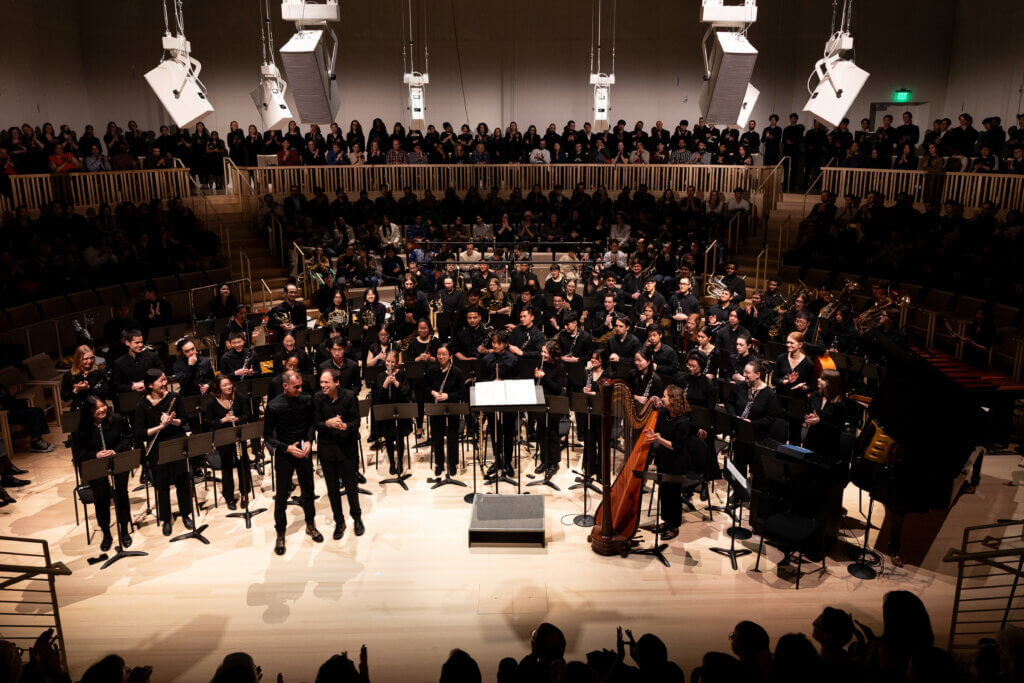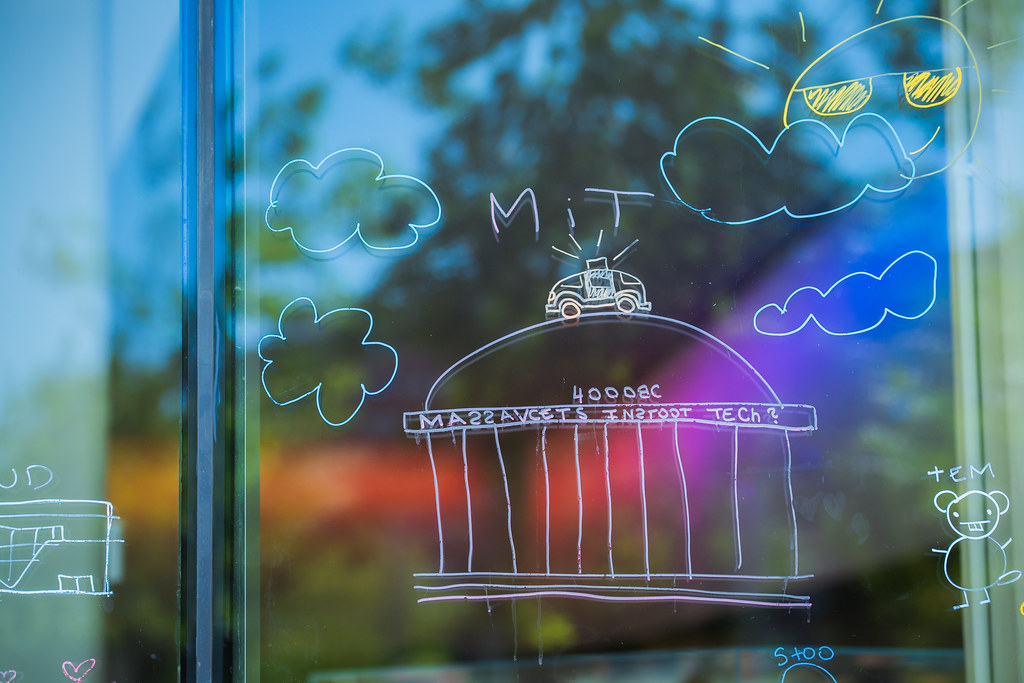Musical Visionary, a Life in Community
The late Jamshied Sharifi ’83 sought transcendence in music-making.

“Stay strong, stay happy. Seek joy. It’s a beautiful and amazing world,” he said.
A chameleon of music, Jamshied Sharifi ’83 kept the beauty of collaborative relationships at the heart of his career and life. Whether an original composition or arrangement, his keyboard playing, conducting, or even a personal interaction, thoughtfulness and gratitude were omnipresent. Sharifi died surrounded by his family, on August 15 in his New York City home. He was 64.

“He is an integral part of MIT’s musical legacy,” noted Kenan Sahin Distinguished Professor of Music Evan Ziporyn. “Jamshied showed me—by example—what it could mean to be a creative musician at MIT.”
Throughout his undergraduate years, his leadership of the MIT Festival Jazz Ensemble, and his frequent MIT collaborations of the past two decades, Sharifi was a consistent light of positivity for the MIT community.
“I felt his highest goal and purpose in life was to find transcendence in music and art,” noted long-time colleague and friend Markus Seiber. “He was someone who loved collaboration and working with people with a vision for the betterment of humanity. He strongly believed that music could be a universal language to overcome boundaries toward unity.”
A pioneer in world fusion, Sharifi simultaneously contributed to jazz, music for film and television, Broadway, pop, and classical concert music. He straddled these musical worlds with ease and professional acumen. His own compositions brought together elements of Middle Eastern and African music and jazz, going straight to the hearts of listeners. His first solo record, A Prayer for the Soul of Layla, was named Best Contemporary World Music Album at the inaugural New Age Voice Music Awards. One, his second solo album, featured collaborations with Paula Cole, Moroccan vocalist Hassan Hakmoun, Tibetan vocalist Yungchen Lhamo, and the Irish-American multi-instrumentalist Séamus Egan, among others.
Sharifi was a prolific and generous record producer with hundreds of recordings to his credit with an astonishing global profile of artists, including world fusion trio Mo Boma, Iranian-American vocalist Mamak Khadem, and world devotional music duos Mirabai Ceiba and Shunia.
As either producer, arranger, or keyboardist, Sharifi recorded and/or performed with artists such as Paula Cole, Ray Charles, Dream Theater, Laurie Anderson, Hassan Hakmoun, Snatam Kaur, Stevie Wonder, and the David Bowie Blackstar Symphony. His work for Broadway included orchestrations for The Last Ship, by Sting, and The Band’s Visit, for which he won the 2018 Tony Award for “Best Orchestrations.”
“Jamshied was one of the great musicians of our community,” said Broadway producer Billy Stein. “He was genuine and all heart to his core.”
His passion for film music led to his scoring and/or contributing music for numerous major studio and independent films such as Muppets From Space, Down To Earth, The Thomas Crown Affair, Clockstoppers, Harriet the Spy, and The Rugrats Movie, among others, and many television shows, including ER and creating arrangements for major vocalists for multiple broadcasts of the annual PBS show A Capitol Fourth.
An often-overlooked talent, Sharifi was an accomplished and forward-looking pianist and synthesizer player. “I have tried to hold the synthesizer up to an ‘acoustic’ standard in terms of playing with the depth of detail and richness of articulation that come naturally to an acoustic instrumentalist,” he said in a 2017 World Music Central interview. To this end he combined a controller to manipulate the synthesizer with his breath along with another controller enabling him to bend pitches evenly with his finger producing what he described as a “wind-driven, fretless synthesizer.”
“He was gifted in so many areas of music that his genius sneaks up on you,” explains MIT music director Fred Harris. “For the past two decades he was among MIT’s most cherished and beloved alumni collaborators.”
A 1983 graduate of MIT and, later, the Berklee College of Music in 1985, Sharifi was endlessly devoted to composing music for MIT students. From his first year as an undergraduate in 1980 to 2025—a 45-year span—he wrote nearly 40 pieces including works for the MIT Festival Jazz Ensemble, the MIT Wind Ensemble, and two MIT large-scale events with the Grammy-winning British singer and multi-instrumentalist Jacob Collier.
As an undergraduate pianist for the MIT Festival Jazz Ensemble Sharifi had contact with one of his key mentors, the legendary trumpeter, bandleader, and educator, Herb Pomeroy. Pomeroy, the founder of MIT’s Jazz program and leader of the MIT Festival Jazz Ensemble for 22 years, asked Sharifi to take over directorship of the ensemble upon Pomeroy’s retirement in 1985. “Herb cared about everyone so deeply,” Sharifi told Technology Review in 2015. “I knew I could not match his level of musicality, so I tried to bring the same love to it that he did.”
That he did for seven years and along the way he produced two recordings, performed many of his compositions, and led the ensemble to top honors at the prestigious 1991 Notre Dame Collegiate Jazz Festival.
“The environment Jamshied created for musicianship, growth, and community was transformative,” reflected former MIT Festival Jazz Ensemble member Joel Johnson ’95.
Among Sharifi’s array of music for the MIT Wind Ensemble in recent years is Awakening (in recognition of the Arab Spring); A Resistance, Now; To The Light, To The Flame; and Praeordinatus Ut Astra Sacrificia Nostra (“Fore-Ordained As Stars Our Sacrifices”), which included the MIT Concert Choir and was premiered in March, 2025, as part of MIT’s Artfinity Festival and in honor of the inaugural season of the Thomas Tull Concert Hall.
Awakening, in a sense, was a full circle experience for Sharifi. Inspired by the Arab Spring, it was an opportunity to compose a work that was particularly personal. Born in 1960 to an Iranian father and American mother in Topeka, Kansas, Sharifi was exposed to Middle Eastern music and jazz from his father and European classical and church music from his mother. With Awakening, he brought these elements together, along with his hope for freedom and unity in the world. The composition, and Sharifi himself, are featured in MIT’s first New England Emmy-winning documentary, Awakening: Evoking the Arab Spring through Music, which was broadcast on PBS.
“His compositions are so meaningful to me because it’s music of the moment that is intentionally conveying a message or lesson,” explains MIT Wind Ensemble alumna and flutist Sara Kornfeld-Sylla. “The responsibility of conveying the message is what gives the music that special immersive effect that both recognizes a moment and also takes you out of it. It brings a beautiful and emotional focus to listening and performing.”
In the last weeks of his life, Sharifi decided to write an arrangement for wind ensemble, choir, and strings of Akal Mahakal, a chant for alignment, transition and release, recorded originally by Mirabai Ceiba, who will perform at MIT’s upcoming tribute event. “It’s a chant in some spiritual traditions to remove the fear of death and to connect with the soul’s immortal nature,” Sharifi said.
“Once again his music will provide us a lesson,” noted Fred Harris. “Jamshied would thrive through people: colleagues, friends, companions.”
“He didn’t want to be at the center,” reflected Markus Seiber. “He always saw the whole of a community; its collective consciousness.”
The MIT Wind Ensemble, MIT Festival Jazz Ensemble, MIT Concert Choir, and some of Sharifi’s close musical colleagues will present A Unity of Purpose—a musical celebration for Jamshied Sharifi on Wednesday, September 17, at 8:30 p.m. in the Joyce and Edward Linde Music Building’s Thomas Tull Concert Hall.
No related posts found.
Share a Story
Do you have a story to share about an event, a publication, or someone in the community who deserves a spotlight? Reach out to the SHASS Communications Team with your idea.
Email SHASS Communications